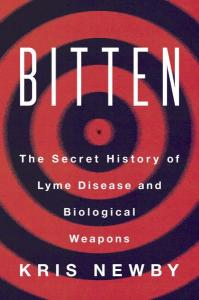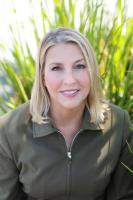
Kris Newby: BITTEN
For this column, NASW book editor Lynne Lamberg asks NASW authors to tell how they came up with the idea for their book, developed a proposal, found an agent and publisher, funded and conducted research, and put the book together. She also asks what they wish they had known before they began working on their book, what they might do differently the next time, and what tips they can offer aspiring authors. She then edits the A part of that Q&A to produce the author reports you see here.
Publication of NASW members’ reports in Advance Copy does not constitute NASW’s endorsement of their books. NASW welcomes your comments and hopes this column stimulates productive discussions.
BITTEN:
THE SECRET HISTORY OF LYME DISEASE
AND BIOLOGICAL WEAPONS
Kris Newby
HarperCollins, May 14, 2019, $28.99
ISBN 10: 006289627X: ISBN 13: 9780062896278
epub ISBN: 9780062896285; Audio ISBN: 9780062932709
Newby reports:
Bitten reveals the untold story of Willy Burgdorfer, the scientist who discovered the bacterium that causes Lyme disease and worked on some of the most diabolical bug-borne biological weapons in America’s Cold War arsenal.
I became interested in tick-borne diseases after my husband and I were bitten by unseen ticks and it took ten doctors to diagnose us and years to recover. My personal experience with the misinformation and politics surrounding tick diseases motivated me to help create the Lyme documentary, Under Our Skin, a 2010 Oscar semifinalist.
I started book research in 2013, after a friend sent me a videotape of Burgdorfer saying that he thought the original outbreak of Lyme disease was the result of a bioweapons release. To research this shocking claim, I spent five years digging through Burgdorfer’s personal papers, visiting archives, and interviewing bioweapons experts and people the researcher knew.From the beginning, I tried to push boundaries of the narrative non-fiction genre, showing the emotional journey Burgdorfer went through as he moved from saving people from bug-borne diseases to turning bugs into weapons of war. Before each morning’s writing session, I’d read a few chapters of The English Patient to get my brain into a lyrical writing mindset.
I learned about the publishing business at the Squaw Valley Community of Writers Workshop and found my agents via a referral at a workshop at the Mayborn Literary Nonfiction Conference. Over eight months, my agents helped me craft a 67-page book proposal that laid out a solid roadmap to follow once I had a book deal.
I took a six-month, unpaid leave from my job as a full-time science writer at Stanford University to write the book. When budgeting, realize that the author is responsible for the expenses associated with author publicity photos, fact checkers, illustrations and photo reprint rights. Once your manuscript is submitted to the publisher, you’ll be on call for quick turnaround edits for the next three months.
My advice to aspiring writers is to hone your early writing in workshops to make sure the story is on the right track.
Contact info:
- Kris Newby: 650-867-8862, krisnewby@comcast.net, http://www.krisnewby.com, @krisnewby
- Book website: https://www.harpercollins.com/9780062896278/bitten/
- Agents: Larry Weissman and Sascha Alper, Brooklyn Literary, 917-843-9048, larry@brooklynliterary.com
- Publicist: Yelena Gitlin Nesbit, 212-207-7075, yelena.nesbit@harpercollins.com
NASW members: will your book be published soon? Take advantage of this opportunity for shameless self-promotion. Submit your report for Advance Copy.
Tell your fellow NASW members how you came up with the idea for your book, developed a proposal, found an agent and publisher, funded and conducted research, and put the book together. Include what you wish you had known before you began working on your book, or had done differently.
See https://www.nasw.org/advance-copy-submission-guidelines.
View Advance Copy archives at https://www.nasw.org/member-article/advance-copy.
Thinking of writing a book? If you are a NASW member, you may access a list of more than 150 books and online resources to help you craft your book proposal, find an agent and funding sources, negotiate your contract, learn about self-publishing, publicize and market your book, and more at https://www.nasw.org/article/write-book.
Send book info and questions about book publishing to Lynne Lamberg, NASW book editor, llamberg@nasw.org.
Advance Copy
The path from idea to book may take myriad routes. The Advance Copy column, started in 2000 by NASW volunteer book editor Lynne Lamberg, features NASW authors telling the stories behind their books. Authors are asked to report how they got their idea, honed it into a proposal, found an agent and a publisher, funded and conducted their research, and organized their writing process. They also are asked to share what they wish they’d known when they started or would do differently next time, and what advice they can offer aspiring authors. Lamberg edits the authors’ answers to produce the Advance Copy reports.
NASW members: Will your book be published soon? Visit www.nasw.org/advance-copy-submission-guidelines for information on submitting your report.
Publication of NASW author reports in Advance Copy does not constitute NASW's endorsement of any publication or the ideas, values, or material contained within or espoused by authors or their books. We hope this column stimulates productive discussions on important topics now and in the future as both science and societies progress. We welcome your discussion in the comments section below.


